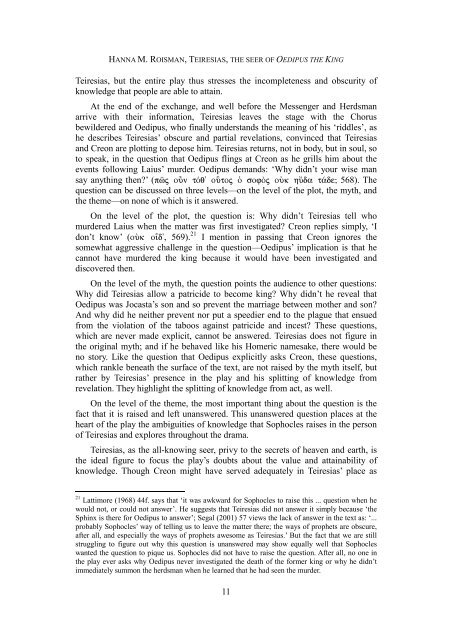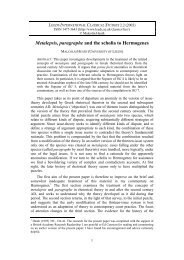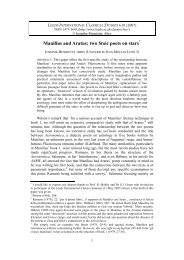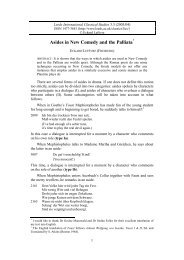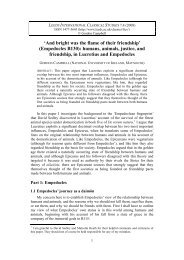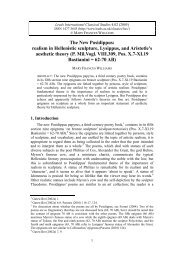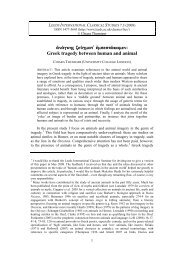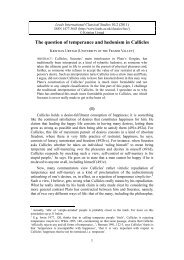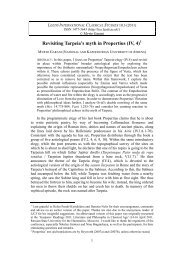Teiresias, the seer of Oedipus the King - Leeds International ...
Teiresias, the seer of Oedipus the King - Leeds International ...
Teiresias, the seer of Oedipus the King - Leeds International ...
Create successful ePaper yourself
Turn your PDF publications into a flip-book with our unique Google optimized e-Paper software.
HANNA M. ROISMAN, TEIRESIAS, THE SEER OF OEDIPUS THE KING<br />
<strong>Teiresias</strong>, but <strong>the</strong> entire play thus stresses <strong>the</strong> incompleteness and obscurity <strong>of</strong><br />
knowledge that people are able to attain.<br />
At <strong>the</strong> end <strong>of</strong> <strong>the</strong> exchange, and well before <strong>the</strong> Messenger and Herdsman<br />
arrive with <strong>the</strong>ir information, <strong>Teiresias</strong> leaves <strong>the</strong> stage with <strong>the</strong> Chorus<br />
bewildered and <strong>Oedipus</strong>, who finally understands <strong>the</strong> meaning <strong>of</strong> his ‘riddles’, as<br />
he describes <strong>Teiresias</strong>’ obscure and partial revelations, convinced that <strong>Teiresias</strong><br />
and Creon are plotting to depose him. <strong>Teiresias</strong> returns, not in body, but in soul, so<br />
to speak, in <strong>the</strong> question that <strong>Oedipus</strong> flings at Creon as he grills him about <strong>the</strong><br />
events following Laius’ murder. <strong>Oedipus</strong> demands: ‘Why didn’t your wise man<br />
say anything <strong>the</strong>n?’ (pîj oân tÒq' oátoj Ð s<strong>of</strong>Õj oÙk hÜda t£de; 568). The<br />
question can be discussed on three levels—on <strong>the</strong> level <strong>of</strong> <strong>the</strong> plot, <strong>the</strong> myth, and<br />
<strong>the</strong> <strong>the</strong>me—on none <strong>of</strong> which is it answered.<br />
On <strong>the</strong> level <strong>of</strong> <strong>the</strong> plot, <strong>the</strong> question is: Why didn’t <strong>Teiresias</strong> tell who<br />
murdered Laius when <strong>the</strong> matter was first investigated? Creon replies simply, ‘I<br />
don’t know’ (oÙk od', 569). 21 I mention in passing that Creon ignores <strong>the</strong><br />
somewhat aggressive challenge in <strong>the</strong> question—<strong>Oedipus</strong>’ implication is that he<br />
cannot have murdered <strong>the</strong> king because it would have been investigated and<br />
discovered <strong>the</strong>n.<br />
On <strong>the</strong> level <strong>of</strong> <strong>the</strong> myth, <strong>the</strong> question points <strong>the</strong> audience to o<strong>the</strong>r questions:<br />
Why did <strong>Teiresias</strong> allow a patricide to become king? Why didn’t he reveal that<br />
<strong>Oedipus</strong> was Jocasta’s son and so prevent <strong>the</strong> marriage between mo<strong>the</strong>r and son?<br />
And why did he nei<strong>the</strong>r prevent nor put a speedier end to <strong>the</strong> plague that ensued<br />
from <strong>the</strong> violation <strong>of</strong> <strong>the</strong> taboos against patricide and incest? These questions,<br />
which are never made explicit, cannot be answered. <strong>Teiresias</strong> does not figure in<br />
<strong>the</strong> original myth; and if he behaved like his Homeric namesake, <strong>the</strong>re would be<br />
no story. Like <strong>the</strong> question that <strong>Oedipus</strong> explicitly asks Creon, <strong>the</strong>se questions,<br />
which rankle beneath <strong>the</strong> surface <strong>of</strong> <strong>the</strong> text, are not raised by <strong>the</strong> myth itself, but<br />
ra<strong>the</strong>r by <strong>Teiresias</strong>’ presence in <strong>the</strong> play and his splitting <strong>of</strong> knowledge from<br />
revelation. They highlight <strong>the</strong> splitting <strong>of</strong> knowledge from act, as well.<br />
On <strong>the</strong> level <strong>of</strong> <strong>the</strong> <strong>the</strong>me, <strong>the</strong> most important thing about <strong>the</strong> question is <strong>the</strong><br />
fact that it is raised and left unanswered. This unanswered question places at <strong>the</strong><br />
heart <strong>of</strong> <strong>the</strong> play <strong>the</strong> ambiguities <strong>of</strong> knowledge that Sophocles raises in <strong>the</strong> person<br />
<strong>of</strong> <strong>Teiresias</strong> and explores throughout <strong>the</strong> drama.<br />
<strong>Teiresias</strong>, as <strong>the</strong> all-knowing <strong>seer</strong>, privy to <strong>the</strong> secrets <strong>of</strong> heaven and earth, is<br />
<strong>the</strong> ideal figure to focus <strong>the</strong> play’s doubts about <strong>the</strong> value and attainability <strong>of</strong><br />
knowledge. Though Creon might have served adequately in <strong>Teiresias</strong>’ place as<br />
21 Lattimore (1968) 44f. says that ‘it was awkward for Sophocles to raise this ... question when he<br />
would not, or could not answer’. He suggests that <strong>Teiresias</strong> did not answer it simply because ‘<strong>the</strong><br />
Sphinx is <strong>the</strong>re for <strong>Oedipus</strong> to answer’; Segal (2001) 57 views <strong>the</strong> lack <strong>of</strong> answer in <strong>the</strong> text as: ‘...<br />
probably Sophocles’ way <strong>of</strong> telling us to leave <strong>the</strong> matter <strong>the</strong>re; <strong>the</strong> ways <strong>of</strong> prophets are obscure,<br />
after all, and especially <strong>the</strong> ways <strong>of</strong> prophets awesome as <strong>Teiresias</strong>.’ But <strong>the</strong> fact that we are still<br />
struggling to figure out why this question is unanswered may show equally well that Sophocles<br />
wanted <strong>the</strong> question to pique us. Sophocles did not have to raise <strong>the</strong> question. After all, no one in<br />
<strong>the</strong> play ever asks why <strong>Oedipus</strong> never investigated <strong>the</strong> death <strong>of</strong> <strong>the</strong> former king or why he didn’t<br />
immediately summon <strong>the</strong> herdsman when he learned that he had seen <strong>the</strong> murder.<br />
11


